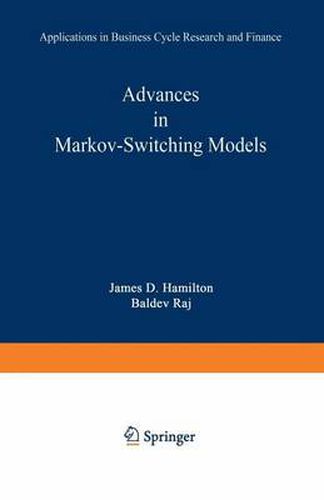Readings Newsletter
Become a Readings Member to make your shopping experience even easier.
Sign in or sign up for free!
You’re not far away from qualifying for FREE standard shipping within Australia
You’ve qualified for FREE standard shipping within Australia
The cart is loading…






This title is printed to order. This book may have been self-published. If so, we cannot guarantee the quality of the content. In the main most books will have gone through the editing process however some may not. We therefore suggest that you be aware of this before ordering this book. If in doubt check either the author or publisher’s details as we are unable to accept any returns unless they are faulty. Please contact us if you have any questions.
This book is a collection of state-of-the-art papers on the properties of business cycles and financial analysis. The individual contributions cover new advances in Markov-switching models with applications to business cycle research and finance. The introduction surveys the existing methods and new results of the last decade. Individual chapters study features of the U. S. and European business cycles with particular focus on the role of monetary policy, oil shocks and co movements among key variables. The short-run versus long-run consequences of an economic recession are also discussed. Another area that is featured is an extensive analysis of currency crises and the possibility of bubbles or fads in stock prices. A concluding chapter offers useful new results on testing for this kind of regime-switching behaviour. Overall, the book provides a state-of-the-art over view of new directions in methods and results for estimation and inference based on the use of Markov-switching time-series analysis. A special feature of the book is that it includes an illustration of a wide range of applications based on a common methodology. It is expected that the theme of the book will be of particular interest to the macroeconomics readers as well as econometrics professionals, scholars and graduate students. We wish to express our gratitude to the authors for their strong contributions and the reviewers for their assistance and careful attention to detail in their reports.
$9.00 standard shipping within Australia
FREE standard shipping within Australia for orders over $100.00
Express & International shipping calculated at checkout
This title is printed to order. This book may have been self-published. If so, we cannot guarantee the quality of the content. In the main most books will have gone through the editing process however some may not. We therefore suggest that you be aware of this before ordering this book. If in doubt check either the author or publisher’s details as we are unable to accept any returns unless they are faulty. Please contact us if you have any questions.
This book is a collection of state-of-the-art papers on the properties of business cycles and financial analysis. The individual contributions cover new advances in Markov-switching models with applications to business cycle research and finance. The introduction surveys the existing methods and new results of the last decade. Individual chapters study features of the U. S. and European business cycles with particular focus on the role of monetary policy, oil shocks and co movements among key variables. The short-run versus long-run consequences of an economic recession are also discussed. Another area that is featured is an extensive analysis of currency crises and the possibility of bubbles or fads in stock prices. A concluding chapter offers useful new results on testing for this kind of regime-switching behaviour. Overall, the book provides a state-of-the-art over view of new directions in methods and results for estimation and inference based on the use of Markov-switching time-series analysis. A special feature of the book is that it includes an illustration of a wide range of applications based on a common methodology. It is expected that the theme of the book will be of particular interest to the macroeconomics readers as well as econometrics professionals, scholars and graduate students. We wish to express our gratitude to the authors for their strong contributions and the reviewers for their assistance and careful attention to detail in their reports.